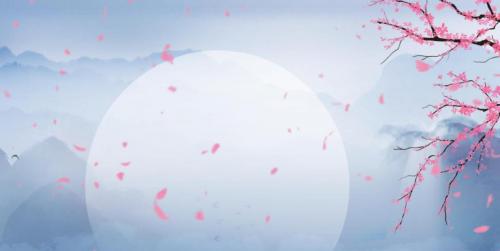Chinese poetry is the most beautiful essence of the Chinese language, hiding the cultural genes of Chinese, and is also one of the best ways for us to inherit traditional culture. Whenever you read those verses, you can feel the beauty behind them, feel the soul and life behind the words, or bold, or graceful, or exquisite, or magnificent, so that our hearts can blend with it.

"Poetry and Speech" is mostly a praise for the homeland, heroes, and hometown; "words and feelings" are mostly nostalgic and lyrical. This is because the development environment of the two is different, and the development of poetry benefited from the unanimous admiration of the imperial court at that time, and it was praised as the "orthodox body of speech and ambition", thus dominating the literary circles of several dynasties. The word is a cultural phenomenon promoted by the literati with the help of the folk. The birth of the masterpiece "The Collection of Flowers" is an example of the promotion of the literati. In the later period, a large number of lyricists such as Su Shi, Xin Zhiyi, and Li Yu either inherited and carried forward, or intentionally or unintentionally broke the traditional shackles, or both. Objectively, it has also achieved innovation and become a songwriter of a transformative generation. In particular, Su Shi's innovative words, using the way of "the great rivers go east, the waves are exhausted", broke the original pattern of the Huajian School, although this change encountered many obstacles, but also substantially changed the direction of the development of the word.
In the creation of poetry, we must firmly abide by the rules, but we must also tolerate new changes, encourage more creation, seek consensus in creation, seek innovation in consensus, and seek development in innovation. "Three Hundred More Songs" was created based on this.
In the creation of "Three Hundred More Songs", the author still uses Pingshui rhyme, Word Lin Zhengyun and King Ding Lexicon, which are personal habits, and using poetry to praise the motherland, praise heroes, and praise hometown is a real attempt to aspire.
The author is Yan Yongguang, majoring in Chinese language and literature. Born in Dalian, Liaoning Province in 1949, he served as the secretary of the mayor of industry and the deputy chief of the Planning and Economics Section in the Office of Quzhou Municipal Government, and retired in 1996. He is now a member of Quzhou Poetry and Yanglian Society, Zhejiang Poetry and Yanglian Society, Chinese Poetry Society and so on. It is signed by the China Book Publishing House "Three Hundred Poems".
Can poetry be colloquial? In fact, the current ancient language is the original spoken language, the original spoken language, slang, and today's modern language, which are consistent with the development pulse of poetry. That is to say, poetry can be colloquial, but it must also have the charm of classical poetry. The innovation of "Three Hundred More Songs" can cater to the acceptance of the public, but also can spread the nutrients of some ancient poems, although the creation is difficult, but the love of the motherland, the worship of heroes make the author go down the road of poetry without hesitation.